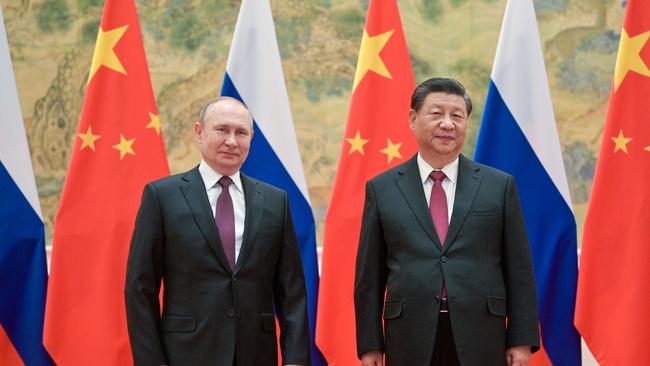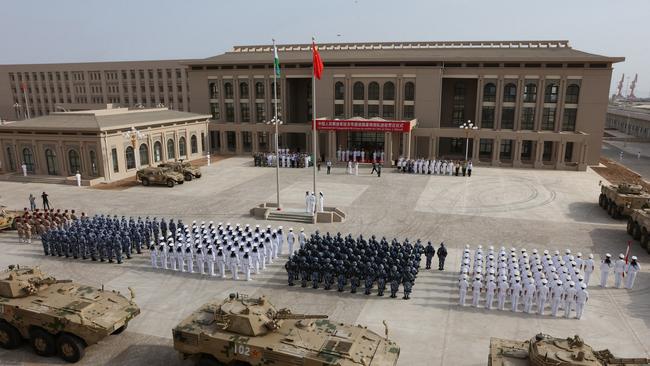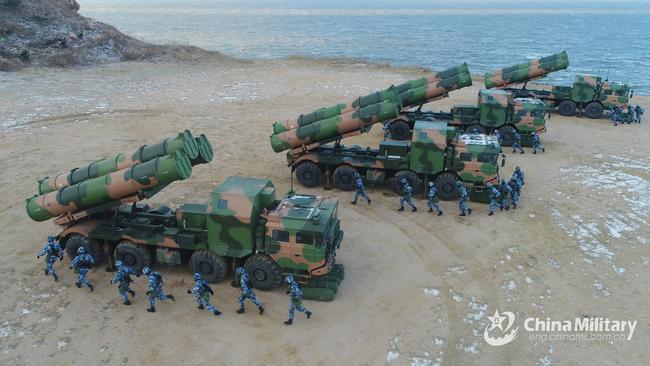Russia’s war could be motivating China to invade Taiwan
Russia’s failings left many experts thinking China would steer clear of invading Taiwan but there are worrying signs Beijing will do the opposite.
Innovation
Don't miss out on the headlines from Innovation. Followed categories will be added to My News.
Beijing may be learning lessons from Moscow’s failures in Ukraine. Just not the ones the West wants it to.
President Vladimir Putin’s invasion of Ukraine came as a relative surprise. Western monitors noticed how military equipment had been left on its borders after “war games” with Belarus ended more than a year ago.
Beijing’s designs over Taiwan have never been a secret. The Chinese Communist Party has always wanted to subjugate the last surviving bastion of the 1949 civil war.
But Chairman Xi Jinping has staked his legacy on assimilating the island democracy.
Now one question is consuming international strategic analysts -- have the odds of a Taiwan war increased or subsided?
Stream the latest news on the war in Ukraine live & on demand on Flash. 25+ news channels in 1 place. New to Flash? Try 1 month free. Offer ends 31 October, 2022 >

Western unity in imposing severe sanctions on Russia and materially supporting Ukraine shocked Moscow and Beijing. And the profound failings of Russia’s military have severe implications for China’s similar forces.
At least, that’s what many Western analysts think.
But does that reflect what Beijing is learning from the experience?
“China’s willingness to use force is a political decision that is shaped by more than just assessments of military capabilities,” argue Centre for Strategic and International Studies (CSIS) analyst Bonny Lin and retired US intelligence officer John Culver.
“Even if China is not confident it can successfully execute an amphibious invasion of Taiwan, Beijing could believe that the geopolitical and internal costs of not using force outweigh the risk of military failure.”
Politics over pragmatism
It’s not precisely certain where Beijing stands when it comes to the invasion of Ukraine.
It’s certainly not being critical of Moscow. But nor is it overtly supportive.
But China’s diplomats have not changed their tune regarding Taiwan.
They continue to warn of “red lines” on matters of trade, official contact and international recognition when it comes to Taipei’s place in the world.
Beijing’s military is enormous. And it is becoming daily more modern and capable. Its ability to overpower its tiny neighbour is much greater than Russia’s.

That doesn’t necessarily have to mean outright invasion.
“A military invasion of Taiwan would be far more complex militarily and even less predictable than in Ukraine,” argues Asia Society of Australia CEO Philipp Ivanov. “The risks of drawing the United States and its allies into a conflict over Taiwan are also higher.”
Instead, it may take the form of military intimidation and pressure – such as the seizure of islands, blockading ports and disrupting fishing fleets.
And China may remain confident that it can cope with any international backlash.
“Beijing may believe that economic sanctions could be more difficult to implement against China without significant collateral damage to global trade, supply chains, and financial institutions,” argue Lin and Culver.
“Nevertheless, Beijing will likely deepen its investment in self-reliance measures and alternative systems to blunt such potential future costs.”
Pride and prejudice
President Putin is doubling down on his conquest of Ukraine.
He’s closed down all independent media outlets. His state-run mouthpieces are frantically pushing propaganda lines to whip up patriotic nationalism.
Beijing’s already there.
Its “Great Firewall” has isolated its people from the rest of the world for more than a decade. Everything they see and hear is designed to suit the Communist Party’s needs.
And that may give Beijing some leeway.
Projecting a sense of wounded national pride may give it the capacity to absorb considerable economic pain.

The Chinese public is being bombarded with Russian conspiracy theories about secret US bioweapons labs buried in Ukraine. It’s being told Moscow’s “security concerns” are valid. State-controlled commentators blame the war on the West.
And Taiwan is not Ukraine.
Beijing sees Taiwan as already a part of China.
It’s just a wayward, disobedient, pro-Western orphan.
Beijing’s Taiwan Affairs Office is busy casting Afghanistan and Ukraine as proof the United States is an unreliable ally concerned only with its own geopolitical interests.
“On the other hand,” add Lin and Culver, “Beijing sees an opportunity to play up a cautionary tale -- Russia’s invasion showcases how devastating a war with China could be and why the Taiwanese public should not support actions that provoke China.”
Jamie Seidel is a freelance writer | @JamieSeidel
Originally published as Russia’s war could be motivating China to invade Taiwan





